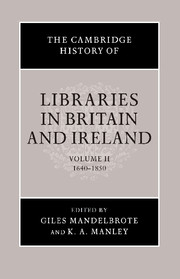Book contents
- Frontmatter
- 1 Introduction: the changing world of libraries – from cloister to hearth
- PART ONE THE EXPANSION OF BOOK COLLECTIONS 1640–1750
- PART TWO LIBRARY DEVELOPMENT AT A LOCAL LEVEL
- PART THREE PROVINCIAL AND METROPOLITAN LIBRARIES 1750–1850
- 18 Libraries in context: social, cultural and intellectual background
- 19 The book trade and libraries
- 20 Ecclesiastical libraries
- 21 Libraries in the parish
- 22 Books and universities
- 23 Libraries and literacy in popular education
- 24 Scientific and medical libraries: the rise of the institution
- 25 The first century of the British Museum library
- 26 The impact of the British Museum library
- 27 Private libraries in the age of bibliomania
- 28 Library architecture and interiors
- 29 Library management in the pre-professional age
- 30 Libraries for an imperial power
- 31 Engines of literature: libraries in an era of expansion and transition
- Select bibliography
- Index
- References
22 - Books and universities
from PART THREE - PROVINCIAL AND METROPOLITAN LIBRARIES 1750–1850
Published online by Cambridge University Press: 28 March 2008
- Frontmatter
- 1 Introduction: the changing world of libraries – from cloister to hearth
- PART ONE THE EXPANSION OF BOOK COLLECTIONS 1640–1750
- PART TWO LIBRARY DEVELOPMENT AT A LOCAL LEVEL
- PART THREE PROVINCIAL AND METROPOLITAN LIBRARIES 1750–1850
- 18 Libraries in context: social, cultural and intellectual background
- 19 The book trade and libraries
- 20 Ecclesiastical libraries
- 21 Libraries in the parish
- 22 Books and universities
- 23 Libraries and literacy in popular education
- 24 Scientific and medical libraries: the rise of the institution
- 25 The first century of the British Museum library
- 26 The impact of the British Museum library
- 27 Private libraries in the age of bibliomania
- 28 Library architecture and interiors
- 29 Library management in the pre-professional age
- 30 Libraries for an imperial power
- 31 Engines of literature: libraries in an era of expansion and transition
- Select bibliography
- Index
- References
Summary
Universities and university towns
The century before 1850 saw the universities of the United Kingdom and Ireland and their libraries develop from the medieval institutions that they still essentially were to the modern institutions that are still recognisable in the twenty-first century. Including what have been described variously as the Enlightenment (especially in Scotland), the ages of reason, of reform and of revolution, it was a period of enormous change in the world of education, and the serious beginning of the continuous change that has lasted for over 200 years. This study focuses on the libraries of universities and university colleges themselves, but also considers briefly the effect on those libraries and their users of other kinds of library nearby. Particularly interesting is the emergence of increasing demands for improved access to libraries and their collections by students as well as professors, and the early development of services to readers.
The university towns in 1750 were the same as they had been in 1650. England had two, Cambridge and Oxford; Scotland had four, Aberdeen (King’s College and Marischal College), Edinburgh, Glasgow and St Andrews; Ireland had one, Dublin (Trinity College, University of Dublin); Wales had none. One hundred years later these had increased and were set to increase further. By 1850 England had new universities in London and Durham. The increasing levels of literacy, education and social reform in the industrial cities of the midlands and the north of England, as well as London, were contributing to the founding of colleges for the professions – doctors, teachers and nonconformist ministers – as well as working men’s colleges.
- Type
- Chapter
- Information
- The Cambridge History of Libraries in Britain and Ireland , pp. 345 - 370Publisher: Cambridge University PressPrint publication year: 2006
References
- 1
- Cited by

